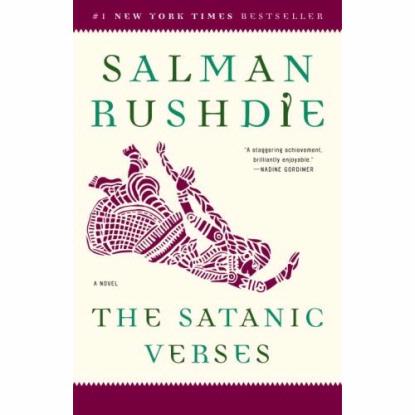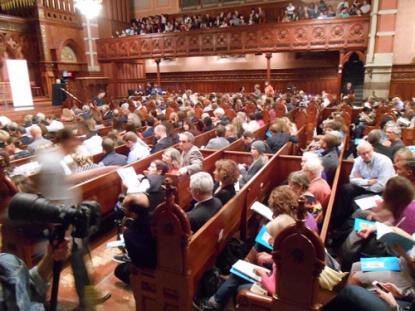
Sir Salman Rushdie has come to stand, in almost clichéd ways, for freedom of speech: we may agree with him or not, but we want to defend his right to say it. But should we agree?
I am not a reader of Rushdie novels, of which the style is usually more surrealistic than I enjoy. But I read with great pleasure an excerpt from his third-person memoir, Joseph Anton (2012, now out in paperback, for which Rushdie is touring) in the New Yorker (The Disappeared, September 17, 2012). A more recent NPR interview with Rushdie and Deepa Metha about her film adaptation of the Rushdie novel, Midnight’s Children, solidified my interest. Apart from all the hullabaloo, the author sounded to me like not only a fundamentally decent man and a serious artist, but also one with a sense of humor I liked: exceedingly apt with metaphor and telling detail (vomiting chickens made it into the interview) and straightforward in a way that George Orwell would have liked. No mincing of words.
Thus it happened that when Rushdie came to Boston to give the keynote of the Boston Book Festival, and Mass Humanities supported the festival, I clearly had to go. There was even a humanities theme par excellence. As Rushdie put it last year in an interview on NPR, Joseph Anton’s narrative has become the narrative of all our lives: the security state is hurting in ways that count. Good thing I got tickets as soon as the event announced, it sold out very quickly.
To set the scene: evening falls on Copley Square; my colleague Hayley and I hurry to Old South Church to get a good place in line. We are an hour early and there are already at least 150 people in line–all holding tickets. There are no signs; we have been told to avoid large bags and to make sure we bring ID. It takes some time to fill up the magnificent church with 600 or more people whose large backpacks and multiple parcels have to be searched one by one.

But then, finally everyone is there, and suddenly there’s the man himself, up front, and the audience is on its feet: you don’t have to ask whether he is a hero to this crowd–this is no “Mass Humanities as an Island of Humanities in the shark-infested Sea of Life.” This is “Mass Humanities participating in events that tackle some fundamental issues that need to be aired.”
The format is simple: Harvard professor Homi Babha (director of the Mahindra Humanities Center at Harvard, whose prose is usually so thick that one needs a spoon with a very sharp edge to be able to ladle it up) was to be in conversation with Rushdie, discussing Rushdie’s decade-plus in hiding as presaging our own post-911 time when the three-letter agencies rule the roost. (FYI: Upcoming events at MHC.)
Pan to the stage: Two late middle aged, well educated, Indian-born, British gentlemen, one born to a Muslim family, the other Parsi, in conversation in the Sanctuary of Old South Church–the church that has been known as the Church of the Finish Line of the Boston Marathon for more than 100 years. It is also the church that houses the congregation whose liberal policies in the seventeenth century made the economic and social development of New England possible; the same congregation that opened the doors of the Old South Meetinghouse to the meetings that begat the Revolution in Boston (or so the story goes). It is a church that must take its role as meetinghouse quite seriously, especially now that bombs have exploded across the street in the name of religion. For that is the only explanation for what followed.
Babha started by establishing his bona fides as Rushdie interviewer by mentioning that, upon completing The Satanic Verses, Rushdie had visited Babha, who had read the novel before publication, and neither had been very worried about what might ensue. Why was that?
The Mullahs had never liked anything he wrote, answered Rushdie, so why would they like this one? However, that was beside the point, and he hemmed and hawed a little before settling upon a phrase, “you see, the Mullahs’ weren’t my audience, not my readership.” Why would they even care? He added, “I don’t write for them,” Rushdie looked from Babha straight at the audience, “fuck them.”
The audience roared and stomped and applauded, and the two “boys from Bombay” as Babha later called them, were emboldened in their pursuits. “This is almost a good enough reason to be in a church,” Rushdie remarked casually. The audience was with him again.
Then he continued to remind us in the same confidential vein that we used to talk about the “God-Squad,” as a sort of a metaphor, but he found out it really exists. Because for a while, many felt he should apologize. “I was told to by the Archbishop of Canterbury, the Chief Rabbi of London, and Jimmy Carter,” he said, pointing out that in the end, if you attack one religion, or even seemingly do so, you apparently attack them all. More ovation. Rushdie was delivering in spades and a whole Sanctuary filled predominantly with Americans applauded wildly as he calmly walked across cultural pieties that Americans usually respect, umm, religiously.
I am making light here, but mind you, I really, really enjoyed myself. I found myself leaning way forward in the pew. Not even so much because Rushdie was straightforward and provocative, but because of how he was so. This slightly old-school-looking-and-sounding gentleman with clear convictions was smashing all sorts of expectations, and sending us a breath of fresh air in the process. Presentation is everything, even in the humanities.
Babha deftly took Rushdie to his memoir and his years of hiding and Rushdie admitted that he now wonders if he should have. It is easy to forget, but people did die as a result of the Fatwa against the novel and all who were associated with it. “There are all sorts of people protected by the state in England, and they live in their own houses. The Prime Minister lives in his own house. And so does the Queen. She has a nice house. My house was nice, too. Not quite that nice, but . . ..” Instead, the condemned author spent years ducking from place to place, egged on by his security team, but always himself in charge of finding and paying for a place to live (which is where the pseudonym, Joseph Anton, came from), getting used to the “security view of the world,” as he called it.
The “security view of the world,” Rushdie explained himself, is a worst-case scenario point of view. All of us cross the street many times, every day. We could get run over by a bus when we do that. We probably won’t, but we might. In the security view, we don’t cross the road to avoid the risk. If you buy into that, said Rushdie, you lose your agency, and your freedom. But since 9-11, our world is dominated by it. “You cannot buy the security view of the world, lest you cannot speak the language of liberty.”
Rushdie took questions. “I am an unbeliever in a community of believers. Do you have any advice for me?” asked one young man, betraying that what really had taken the audience was Rushdie’s audacity in condemning/making fun of religion in a church.
Rushdie had a parting shot: “You might take solace from the fact that you are right and they are wrong.”
Ah, the man has a way with words. In the end, the Boys from Bombay were quite happy with their performance, and so was the audience, having been treated to a show of worldly wit and erudition, and been given a couple of interesting ideas to chew on.
I got my copy of Joseph Anton signed. Now all I have to do is read it. It’s available in all formats if you want to, also.


